Search
Showing 10 of 1867 results for how to register international groups
-
Record audience for early childhood education symposium with China
This year, the symposium attracted a live audience of 350 attendees and a livestream audience of 100,000, well over the number of attendees in previous years. The symposium’s theme was ‘Advancing Inclusiveness in Early Childhood Education’.
The Early Childhood Education Symposium is an initiative between Education New Zealand Manapou ki te Ao (ENZ) and China Center for International People to People Exchange (CCIPE), a sub-agency of China Ministry of Education (China MoE).
The symposium provides a platform for New Zealand Early Childhood Education (ECE) institutions, academics, practitioners, and policy experts to engage in a cross-cultural dialogue. It leverages New Zealand’s expertise in ECE teacher training programmes.
This was the first year that a delegation of government representatives and ECE experts from New Zealand travelled to China to present at the symposium in person, which sent a positive signal to education partners in China about New Zealand’s strong focus on reconnecting and strengthening our education credentials in the China market.
The symposium’s live presenters from New Zealand included Dr Jane Ewens, Manager Early Learning, Ministry of Education and Fiona He, Director and Founder, TuiTui Educare/Universal Kids Early Education Centre. Dr Ewens presented an overview of the New Zealand Government’s policy focusing on advancing inclusiveness in early childhood education.
ENZ’s General Manager International, Lisa Futschek, who provided opening remarks, said the symposium highlighted the special education relationship between New Zealand and China and our long and fruitful dialogue in a variety of education areas.
“It’s fantastic to see how the symposium has grown and evolved since 2020. We were delighted to be able to travel there, grow our connections in-person, and enable collaboration between people across the education landscape in both our countries.
“2023 has already been an exciting year for rebuilding face-to-face connections for New Zealand and China, and the symposium just helped us build on that so wonderfully,” Lisa said.

ENZ General Manager International, Lisa Futschek.
CAO Diefeng, Deputy Director General, China Centre for International People-to-People Exchange indicated in his opening remarks that the China-New Zealand Early Childhood Education Symposium has received extensive attention because of its scale and influence. It is highly welcomed by the education sector from both China and New Zealand and is becoming a key platform for early childhood education communication.
“The symposium exemplifies the sound education cooperation between our two countries and plays an important role in deepening substantive cooperation by both sides,” CAO Diefeng said.
Dr Jane Ewens said the information exchange was valuable to all audiences and demonstrated there are opportunities for the Ministry of Education to learn from our Chinese partners.
“We can create stronger educational ties and foster ongoing cooperation with China, aligning with government priorities. This could include exploring attracting Chinese teachers and students to New Zealand's early childhood education teaching workforce.
“There is also an opportunity for New Zealand practitioners and policy makers to consider and possibly integrate how China implements their curriculum as we develop curriculum resources for New Zealand Early Childhood Education kaiako (teachers),” Dr Ewens said.
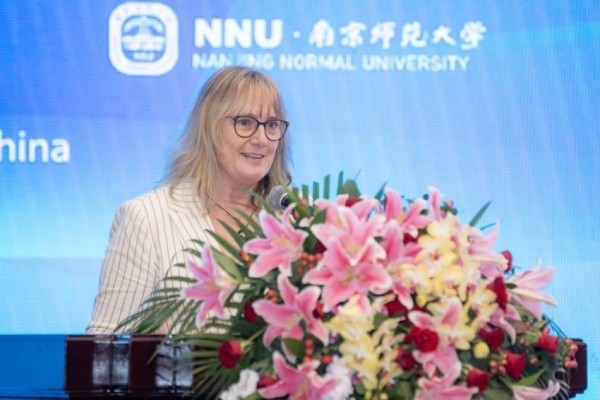
Dr Jane Ewens from the New Zealand Ministry of Education presents the Policy Overview.
This year’s symposium resulted in a range of valuable outcomes for New Zealand’s education relationship with China and for the sector. The symposium generated good visibility for New Zealand, with 45 media articles (accounting for almost four million views), which included reporting from top tier Chinese media. Many connections and leads for New Zealand participants were created during and after the symposium – one New Zealand speaker reported being approached by 50 Chinese counterparts after their virtual presentation.
Aside from the symposium, the New Zealand delegation’s key objectives included supporting a bilateral education initiative linked to the New Zealand-China Arrangement on Education Cooperation and Training, while showcasing New Zealand’s expertise in early childhood education practices and curriculum to audiences in China.
The visit provided a chance for the delegation to understand best practices in early childhood education from a Chinese cultural perspective that they could put into practice in New Zealand to better support learners from Chinese backgrounds. As part of the programme in Nanjing, the delegation visited two kindergartens and presented a panel session with academics and students at Nanjing Normal University.
If you are interested in the ECE Symposium or partnering with ENZ on this event in the future, please contact the ENZ China team at China@enz.govt.nz.
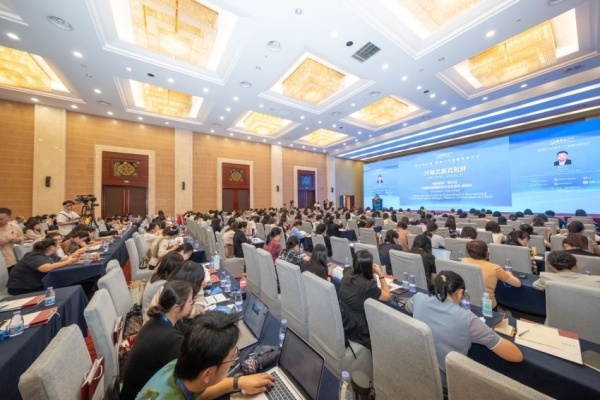
The audience in Nanjing take notes during the presentations.
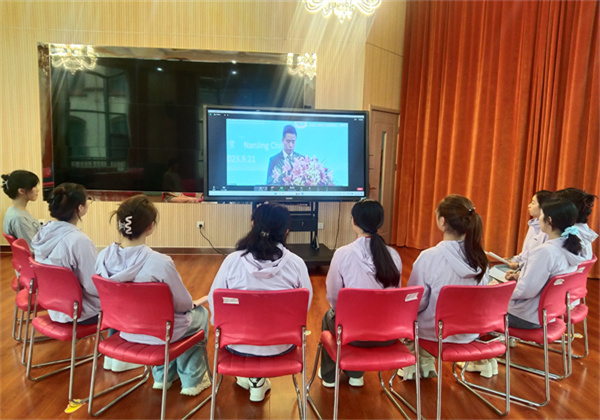
Attendees of the Hefei Shuangyou Education Group in Anhui Province watch the symposium online.
-
“Feedback is a gift” - Education New Zealand Manapou ki te Ao’s 2023 Sector Survey
We would like to thank the many respondents who took the time to answer the survey, including universities, schools, Private Training Establishments, English Language Schools, education product and services companies, Te Pūkenga, peak bodies, and regional economic development agencies.
Undertaken annually, the survey helps ENZ to understand what is important to the sector, what services and support provide the most value, and where there are opportunities for ENZ to improve our offerings.
In 2023, 73% of the sector agreed that ENZ’s services and support over the past year had added value to their organisation, Business and market advice and E-News were ranked as the most useful services.
Areas such as ENZ’s in-market advice and informed intelligence were highlighted as being helpful to the sector in making timely, informed decisions, as is the support to re-establish and consolidate presence in existing markets while exploring new growth opportunities. The opportunities that ENZ provides for international partnerships was also highlighted as helpful.
The survey is also important in identifying the areas in which the sector would like ENZ to focus more. This included more advance notice on upcoming events and opportunities, providing more clarity on the range of services and support available and building more strategic partnerships across the wider sector.
Sharon-May McCrostie, ENZ’s Director of Sector Engagement said that while this survey is held annually, ENZ welcomes ongoing feedback on how ENZ can best support the New Zealand international education sector to grow.
“These surveys are considered an important scorecard for us to understand where we are meeting expectations with our stakeholders but also opportunities to improve our support to the sector.
“Looking ahead to 2024, the sector has said it would like to see us improve our engagement around integrating views of the sector in our planning and promoting the value that the international education sector brings to NZ,” added Sharon-May.
For information on ENZ’s digital tools, resources, and insights available to the NZ international education sector, check out MaiENZ.
-
Increased flight connectivity between NZ and China
Hainan Airlines has announced a new route from the Hainanese capital (Haikou) to Auckland. The flight schedule will include flights three times a week with the first flight taking place on 8 December.
Hainan’s new link means that Haikou becomes the sixth city in mainland China to be served nonstop from Auckland International Airport, joining Beijing, Guangzhou, Hangzhou, Shanghai and Shenzhen.
By mid-December, Air China will be offering daily flights to Auckland International Airport from Beijing Capital International Airport, while China Southern Airlines will fly double-daily from Guangzhou Baiyun International Airport. China Southern Airlines also resumed its Guangdong to Christchurch flights on Friday 10 November.
-
Sign up to the Immigration New Zealand International Education email
People working with the international education sector can sign up to receive emails from Immigration New Zealand with information and updates on international education and immigration matters.
These emails are aimed at education providers and offshore agents acting for students but may be of interest to others involved with the international education sector.
Subscribe to updates & newsletters | Immigration New Zealand
-
Around the world in five
Asia
The rapid increase in educational agencies in China, up 242.48% since 2021, has fragmented the market, requiring universities to intensify their efforts in vetting agencies. Despite the challenges, this diversification could lead to improved services and lower costs for students and families.
North America
Canada will cap international student permits at 360,000 for two years, a 35% cut from 2023, with exclusions for master's and PhD students. This move aims to manage the rapid growth of international students, with a review of permit applications in 2025 and changes to post-graduation work permits.
South America
Argentine agencies saw a surge in students traveling abroad in 2022, primarily to the UK, Canada, and the USA. Language courses remained dominant, with rising interest in secondary and higher education sectors and more bookings for junior programs, indicating a recovery in group travel for young learners.
Europe
British students not being ‘squeezed out’ by overseas applicants, say universities
UK universities deny disadvantaging domestic students in favour of international applicants, highlighting that different entry requirements for foundation programs are not indicative of unfair practices. Data shows increased enrolment of UK students at Russell Group universities, with a balanced intake of international students, emphasizing the importance of global students for financial sustainability amidst fixed domestic tuition fees.Africa
Africa's job skills gap is widening due to tertiary education not aligning with economic needs, with most countries below the global average for higher education enrolment. Curriculum reforms are needed to include digital and entrepreneurial skills to address unemployment and enhance competitiveness.
-
New Zealand well represented at the 2024 World Digital Education Conference
The 2024 World Digital Education Conference, attended by representatives from over 70 countries and regions as well as international organisations, aims to work with governments, the education sector, and stakeholders to jointly implement the outcomes of the United Nations Transforming Education Summit, promote education recovery post-pandemic, equitable quality education through digital education transformation, and advance the realisation of the Sustainable Development Goals (SDGs).
Chinese Education Minister Huai Jinpeng provided the keynote speech at the opening ceremony. He noted the impact of technology on education and the need to prioritise education reform to keep pace with changes and harness the benefits of digital education. Minister Huai concluded by saying they look forward to the new impetus into promoting international cooperation in digital education through this conference.
New Zealand was represented by Minister of Education, Hon Erica Stanford (through a pre-recorded session); H.E. Grahame Morton, New Zealand Ambassador to People’s Republic of China; Ardi Barnard, New Zealand Consul-General to Shanghai; Dr Grant Klinkum, Chief Executive New Zealand Qualifications Authority and Education New Zealand’s China-based representatives. The strong presence at the conference contributes to New Zealand’s reputation as an education partner with an innovative approach to digital learning. New Zealand Education Minister Hon Erica Stanford gave a video address and shared New Zealand’s efforts to harness digitalisation to improve our education system and support lifelong learning.
“As an education minister with a relentless focus on the progress and achievement of all students, I see that digital tools and the well-designed use of data have enormous potential to help us drive progress and achievement,” said Minister Stanford.
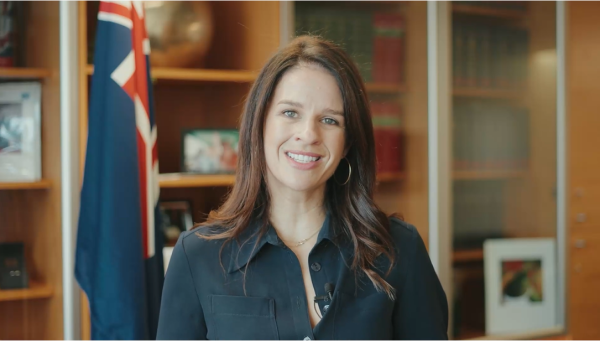
Hon Erica Stanford, New Zealand’s Minister of Education delivered a pre-recorded session, sharing New Zealand’s efforts to harness digitalisation and data in education.
In his address at the Opening Ceremony, Ambassador Morton highlighted the important role of education in the New Zealand-China relationship and gave insights into New Zealand’s innovative EdTech sector.
“Digital education is at the centre of New Zealand’s EdTech sector and its developments. Three-quarters of New Zealand EdTech companies are actively looking to take their offerings to the world,” said Ambassador Morton.
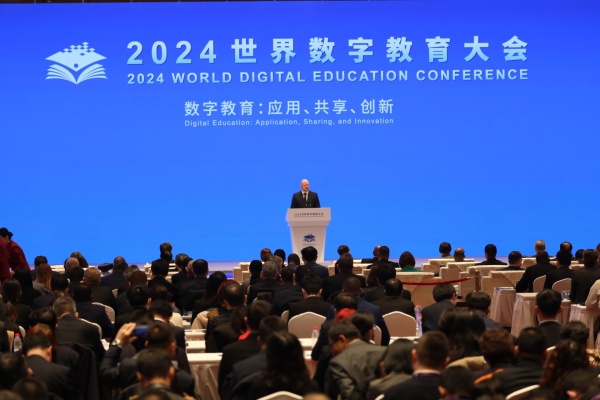
Ambassador Morton addresses the audience during the Opening Ceremony of the conference.
During the Parallel Session on Governance and Digital Transformation, Dr Klinkum shared New Zealand’s experience in quality assurance, qualification recognition and assessment delivery in the digital era.
“We would like to continue working with our international colleagues to ensure that we provide credible education for learners and that life-long learning and global mobility is supported by digital education and reflects the needs of increasingly digital societies,” said Dr Klinkum.
During the conference, organisers held the inaugural launch ceremony of the World Digital Education Alliance (WDEA). Universities New Zealand, on behalf of the University sector, joined the Alliance. The first batch of members is by invitation and as of 30 January 2024, 104 agencies from 41 countries joined the alliance ranging from schools to Technical and Vocational Education and Training (TVET) institutions, training centres, colleges and universities as well as research institutions and enterprises. The initiative aims to fulfil the UN SDG 4, build a mechanism for international cooperation and exchange in digital education, form synergy to promote global educational development, and create a new environment for smart education.
-
PIF Recipient: Chasing Time English
Across the world, there is a vast market for English language learning. To put a number on it – around one billion learners. In many countries, though, English is taught through repetitive, mostly grammar-based content. The result is two-fold: students become disengaged and disinterested, and they advance in writing and reading skills at the expense of speaking skills.
Chasing Time English is a New Zealand company on a mission to make English language learning engaging, exciting, and effective for educators and students around the world. How? Through video. The team at Chasing Time English believe that English language classes should excite and inspire students to learn more, and decided video was the best medium to achieve this.

Chasing Time English uses engaging video story content to educate learners.
Through original, live-action-drama videos, Chasing Time English brings intrigue, humour, surprise and suspense into learning. Redrawing the line between education and entertainment, the short videos produced by Chasing Time English are designed to stand alone as quality entertainment, with strong learning outcomes embedded throughout.
To achieve this feat, the company brings together a team of English language educators, applied linguists and filmmaking professionals, who collaborate to create compelling, narrative-based drama content backed up by a cutting-edge pedagogy.
While other education publishers also produce English language learning video content, this is often lower quality video with limited learner appeal and retention. By creating professional quality drama content, Chasing Time English has become a market leader in English language video learning. Captivate learners, and the learning will follow.
Chasing Time English is one of the successful recipients of funding from the International Education Product Innovation Fund, a New Zealand Government-funded initiative to support pilot projects that reimagine and rethink what a New Zealand education experience can look like and mean for global learners. Education New Zealand Manapou ki te Ao (ENZ) is the government agency responsible for international education and is managing the Product Innovation Fund.
ENZ will work in a partnership approach with each successful recipient, sharing skills, expertise and resources to help each pilot succeed and develop into a self-sustaining education offering. The lessons learned through the pilot projects will be shared for the benefit of New Zealand’s entire international education sector, with a view to encouraging innovative, new offerings for international learners to experience a New Zealand education.
The Product Innovation Fund award will enable Chasing Time English to design, develop and deliver a new set of programmes for high beginner to elementary English language learners and educators. Target audiences include New Zealand education institutions with offshore partners, high schools in Japan and the Netherlands, and English language teachers at the post-beginner level.
Across two programmes of 10 weeks each, learners will be able to access up to 100 hours of engaging resources, including Chasing Time English’s distinctive video content, along with other audio and video resources and communication-based activities. The new set of programmes will incorporate a strong New Zealand theme, sharing New Zealand storytelling and themes of environmental sustainability and innovation. The original video content will also showcase New Zealand’s spectacular natural scenery, helping inspire learners and build a connection with New Zealand, wherever they are in the world.
With the support of ENZ through the Product Innovation Fund, Chasing Time English is set to continue growing its impressive offering for English language learners around the world. Already setting the bar for the quality of its learning resources and pedagogy, this Kiwi education provider is showing that online learning can be fun and effective, while also showcasing New Zealand’s landscapes, people and values to learners wherever they are.
More information:
-
PIF Recipient: Te Whare Wānanga o Awanuiārangi
Te Whare Wānanga o Awanuiārangi is one of New Zealand’s three wānanga - publicly owned tertiary institutions which provide education in a uniquely Māori cultural context. Awanuiārangi has been engaging internationally for over a decade, delivering postgraduate programmes to Indigenous communities in Washington State and Hawaii, and establishing networks and alliances with Indigenous communities and education providers across the United States.
Now, a new project led by Awanuiārangi is set to accelerate Indigenous education outcomes globally and build on New Zealand’s position as a global leader in postgraduate Indigenous education. ‘Iwi taketake’ (Indigenous people) is a project that will see the development of an international Indigenous curriculum for postgraduate study, covering master’s degrees, postgraduate certificates and diplomas, through to doctoral qualifications.
The target audience for the programme is Indigenous college graduates based at Hawai’i, Washington State, Canada and Australia, with Indigenous college graduates and tribal communities across the United States also in focus. A key objective of the new model is to design an education offering that fits the learner, rather than requiring learners to fit the programme.
Awanuiārangi will take its model of working with local hapū, iwi and their representative organisations in Aotearoa to the four focus areas in the Unites States, where it has already established networks. Iwi taketake will be the result of a co-construction process with Indigenous organisations and potential scholars, with an in-person wānanga (symposium) taking place at each delivery site in the United States.
After the curriculum is developed, endorsed and approved by key stakeholders, Awanuiārangi aims to run Iwi taketake for its first cohort of scholars in 2024, through a blended mix of in-person and online learning across the four sites. The programmes that form the Iwi taketake curriculum may be co-badged - awarded jointly by Te Whare Wānanga o Awanuiārangi and partners offshore, such as the University of Washington Tacoma and the University of Hawai’i Maui College.
Awanuiārangi’s model will affirm the notion that postgraduate education can provide Indigenous scholars with pathways for purpose-led careers that benefit people, place and planet. The subject areas and kaupapa (initiatives) covered by the curriculum will be delivered in a culturally safe environment, respecting Indigenous research ethics and methodologies. Scholars will draw learning directly from their own communities with the support of Awanuiārangi and their local delivery partners, ensuring that programmes are highly relevant to learners’ cultural and social contexts.
The collaborative, co-constructed programme will also serve to strengthen Indigenous links and alliances between New Zealand and the United States more generally, and open further opportunities for collaboration and improving educational success in postgraduate study.
Iwi taketake is one of the initiatives supported by the International Education Product Innovation Fund, a New Zealand Government-funded initiative to reimagine what a New Zealand education can look like and mean for global learners. Education New Zealand Manapou ki te Ao is New Zealand’s government agency dedicated to international education, and is the kaitiaki (guardian) of the Product Innovation Fund.
The Fund is supporting a range of pilot projects that develop and test new education products and services for global learners. Awanuiārangi’s pilot project explores how New Zealand’s strengths in Indigenous education can be delivered to international learners, tailored to Indigenous communities in other countries, and delivered in a blended medium, while uplifting all parties and helping strengthen Indigenous connections and cooperation across the Pacific.
More information:
Learn more about Te Whare Wānanga o Awanuiārangi
*Image at top of page: TWWoA's Professor Mera Penehira with Big Island of Hawaii cohort of doctoral students: Katie Benioni, Nancy Levenson, Noekeonaona Kirby and Taffi Wise.
-
Around the world in five
Australia
Students express anger over visa fee hike
Students are expressing anger, sadness and disgust in response to the Australian Government’s announcement on Monday that say student visa application charges increase by 125 per cent to $A1600. Many are saying the rise in fees is unfair and excessive.
Canada
International students contributed $31 billion to Canadian economy in 2022
An updated analysis from Global Affairs Canada (GAC) estimates that the combined direct and indirect GDP contribution of all students expenditures in the country amounted to CDN$30.9 billion (US$23 billion) in 2022. That amounts to nearly a quarter of Canada’s service exports for the year, placing education among Canada’s top export sectors.
United Kingdom
Researchers fool university markers with AI-generated exam papers
Researchers at the University of Reading fooled their own professors by secretly submitting AI-generated exam answers that went undetected and got better grades than real students. The university’s markers – who were not told about the project – flagged only one of the 33 entries, with the remaining AI answers receiving higher than average grades than the students.
China
Exam scandals spark fears for overseas student recruitment
China has become embroiled in a fresh cheating scandal involving the international exams used for admissions to universities overseas after a large number of test-takers reported having their scores in the United States Advanced Placement (AP) exam cancelled because of alleged misconduct.
Bangladesh
Bangladesh “rising market” that could be key to diversifying – report
An improving economy in Bangladesh with more families choosing to invest in education has seen the country rapidly emerging as a “significant market in the global education sector”, a Sinorbis and ETS report said.
-
ENZ staffing changes in Washington, D.C
On Friday 27 September Amy Rutherford, our Regional Director – Americas, the Middle East, and Europe and Counsellor (Education), will be finishing after eleven and a half years at ENZ.
Amy started at ENZ in 2013 as an International Market Manager for China. She has been in Washington, D.C. since 2018, having been in Los Angeles prior to that as ENZ’s Director of Education, North America. Prior to working for ENZ, Amy studied in the United States as an undergraduate student and worked for the University of Otago in the North American and European markets, as well as the New Zealand Resident Director for a US study abroad provider, the Institute for Study Abroad (IFSA).
“As a colleague of Amy’s in the International team, I’ve greatly appreciated Amy’s knowledge and expertise and I know she has built of wide network of trusted colleagues across New Zealand’s international education sector,” Acting General Manager Ben Burrowes said.
Ben added, “on behalf of ENZ, it is my privilege to congratulate Amy on an outstanding tenure at our organisation and we wish her well for the next step in her professional career”.

ENZ’s Regional Director - Americas, Middle East and Europe, Amy Rutherford (centre) will be finishing with ENZ on Friday 27 September. Associate Director of Engagement – North America, Natalie Lulia (left), will be acting in the role from Monday 30 November.
We are delighted that Natalie Lulia, currently Associate Director of Engagement – North America, will step into the role of Acting Regional Director - Americas, Middle East and Europe on Monday 30 September.
"Natalie has been a fantastic addition to ENZ and steps into the role at a particularly important time as we implement our 2024 – 2027 business strategy,” Mr Burrowes said.
Natalie first joined ENZ in October 2023. Prior to ENZ, she was Director – Māori for the Centres of Asia-Pacific Excellence (CAPE) and Strategic Advisor, International Indigenous Development at Te Whare Wānanga o Waikato - University of Waikato. There, she led a team passionate about Māori business capability, Global Citizenship Education and raising awareness to establish meaningful relationships in the Asia-Pacific, particularly with indigenous communities.

